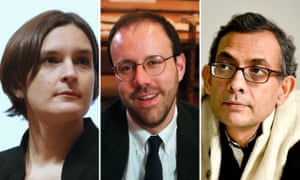NOBEL PRIZE IN ECONOMICS WON BY BANERJEE, DUFLO AND KREMER FOR FIGHTING POVERTY...
Academics who pioneered on-the-ground experiments to discover the most effective ways to tackle poverty in the developing world have been awarded this year’s Nobel prize for economics.
Abhijit Banerjee and Esther Duflo, of the Massachusetts Institute of Technology, secured the 9m Swedish krona (£720,000) prize with the Harvard professor Michael Kremer on Monday.
The Swedish academy of sciences said they were awarded the Sveriges Riksbank prize in economic sciences, given in memory of Alfred Nobel, for research findings that have “dramatically improved our ability to fight poverty in practice”.
Duflo, 46, who is only the second woman to win the economics prize and the youngest in the prize’s 50-year history, said she was surprised by the award, especially as it was usually bestowed on older, more experienced academics.
Asked if it was important that a woman was recognised by the academy, she said: “Showing that it is possible for a woman to succeed and be recognised for success I hope is going to inspire many, many other women to continue working and many other men to give them the respect they deserve.”
Duflo, who has travelled widely in developing countries testing out how best to alleviate poverty, is already well-known on the economics circuit after winning the 2010 John Bates Clark Medal, which singles out economists under 40 that have made “the most significant contribution to economic thought and knowledge”.

The academy said the winners had shown there was a need to adopt new approaches in the fight against poverty that were based on field trials rather than prejudice or the failed methods of the past.
Giving one example, the academy said: “As a result of one of their studies, more than 5 million Indian children have benefitted from programmes of remedial tutoring in schools.”
With 700 million people still living in extreme poverty and many children leaving school without a basic education, the academy said it was important that studies identified the causes of poverty to draw conclusions about the causal effects and implement policies that were cost effective.
“Their experimental research methods now entirely dominate development economics,” the academy said.
Duflo worked with Kolkata-born Banerjee, her husband, following up experiments by Kremer, which the academy said the couple “broadened and deepened”.
Duflo said their work was devoted to making sure “the fight against poverty is based on scientific evidence”.
She said: “Poor people are supposed to be either completely stupid, desperate, lazy or entrepreneurial. But we don’t try to understand the deep root, the interconnected root of the problem.
“So what we try to do in our work is unpack the problems one by one to better understand the reasons for particular problems. What works, what doesn’t work and why.”
Comments
Post a Comment